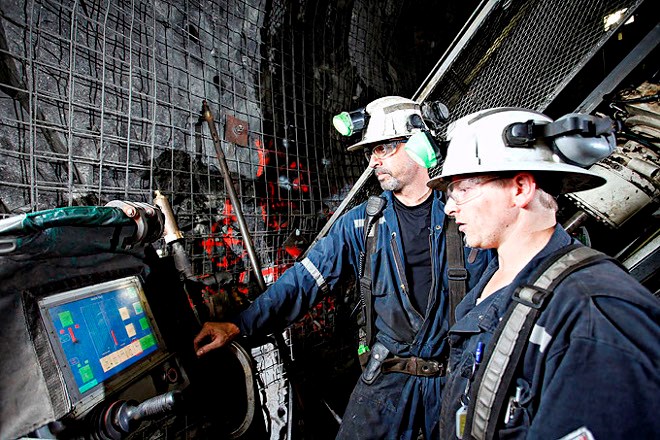Pragmatism, innovation, and people dominated the early discussions at the Maintenance, Engineering and Reliability/Mine Operations Conference (MeMO) in Sudbury, Oct. 17.
The heads of Sudbury’s three leading mine operations led off the first session of the two-day conference, discussing how to lead and manage in a volatile economy.
The conference brings together mine operators to share information on reducing costs and increasing productivity and improving safety and reliability in mining.
It is run by the Canadian Institute of Mining, Metallurgy and Petroleum (CIM).
Rather than focusing on optimistic predictions of when the current downturn will end, the panelists focused on how they are adapting to the low nickel prices and demand, by driving for innovation and maximizing the potential of people at their companies.
“There was nothing in what people talked about in metal markets that was optimistic,” said moderator Bruce Jago, the executive director of the Goodman School of Mines at Laurentian University. “Until they chew away at that nickel surplus... the price is going to go nowhere.”
“Things haven't been this bad, this long, in decades” echoed Stuart Harshaw, vice-president of Vale’s Ontario operations.
However, mine operators are adapting. “This is the new normal,” said Peter Xavier, vice-president of Glencore’s Sudbury operations.
But the phrase easily applies to attitudes towards the downturn in general. “I think [the phrase] is an indication that this is going to last longer, and by the time metal prices change, that will be a new normal, but this is a prolonged downturn,” said Jago.
He can recall five or six downturns since he began his career, but this one is different and requires unique strategies.
“People need to stop talking down and get down to it, and people here are doing that,” said Jago, pointing to innovation centres and academic research happening in Sudbury, and how companies are collaborating.
When Jago moved to Sudbury in 1991, he said people from different mining companies simply didn't work together.
Today, he is happy to see developments like KGHM mining an ore body using Glencore infrastructure underground.
Along with the innovation and cooperation showcased by the panelists, all four highlighted people as their greatest resource during the ongoing downturn.
Xavier pointed to coaching, business sessions and investing in people as ways Glencore is prioritizing its people.
Frank Demers, general manager of KGHM's Sudbury Operations, said they are “leveraging the power of people” through “engagement, continuous improvement, developing their team, and embracing change.”
Jago said that is the message that came out of the panel and set the stage for the rest of the conference. “The new normal is going to be about increasing the productivity of your staff... because you're treating people better, communicating better, that'll make a world of difference."




